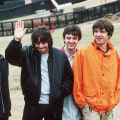The Hacienda Club has long been an iconic part of the Manchester rave scene. From its beginnings in the 1980s as a live music venue to its transformation into a clubbing mecca, the Hacienda has been at the heart of the city's musical heritage for decades. In this article, we will explore the origins of the Hacienda Club and how it helped shape the Manchester rave scene. We will also look at the people and events that helped make the club a household name in the city and beyond.
The Hacienda was first opened by Factory Records in 1982 and quickly became a popular venue for live music. It was also a regular spot for DJs to perform, with some of the biggest names in electronic music playing there, including 808 State and A Guy Called Gerald. The club also hosted many legendary nights such as Shoom, the Haçienda Funk All-Nighter and The Haçienda House Party. These events helped to establish Manchester as an epicenter of rave culture and set the tone for the rest of the UK. The Hacienda Club opened in 1982 and was owned by Factory Records, a Manchester-based independent record label.
The club quickly gained popularity and was a key player in the city's emerging rave scene. It hosted events featuring some of the biggest names in electronic dance music, including Daft Punk, Kraftwerk, and Aphex Twin. The club also played a role in establishing the 'Madchester' sound, which blended indie rock and electronic dance music. The Hacienda Club was renowned for its lively atmosphere and avant-garde décor.
Its walls were adorned with psychedelic artwork and its dancefloor was packed with people dancing to the latest electronic tunes. The club was also known for its strict door policy, which required guests to present a valid ID before they could be admitted. The music played at The Hacienda Club had a major influence on the Manchester rave scene. Many of the city's emerging electronic artists were inspired by its unique sound, which combined elements of techno, house, trance, and acid house music.
These artists went on to create their own genre of dance music, which became known as 'Madchester'. This genre blended elements of indie rock with electronic dance music and was heavily associated with The Hacienda Club. The Hacienda Club eventually closed in 1997 due to financial difficulties. Despite its closure, it is still remembered as one of Manchester's most iconic nightlife destinations and an important part of the city's musical heritage.
The Impact of The Hacienda Club
The Hacienda Club played an important role in the development of the Manchester rave scene. It provided an accessible platform for emerging electronic artists to showcase their music, helping to popularize genres such as techno, house, trance, and acid house. This, in turn, led to the emergence of Madchester, a genre that blended elements of indie rock with electronic dance music. The club's influence is still felt today, with many of its former regulars going on to become successful producers, DJs, and promoters. Its legacy is that of providing a safe and open space for people to come together and enjoy electronic music, which continues to be popular today. The Hacienda Club was also an important cultural hub for Manchester.It helped to foster a sense of community and inclusiveness among its patrons and was a place for people from all walks of life to come together and express themselves. The club's iconic status in the city continues to this day. The Hacienda Club was a major influence in the development of Manchester's rave scene, and its impact on the city's music culture is still felt today. Its innovative atmosphere, eye-catching décor, and unique blend of electronic dance music and indie rock played a crucial role in popularizing genres such as techno, house, trance, and acid house. Madchester, a genre heavily influenced by The Hacienda Club, continues to be popular today.
The club may have closed in 1997, but it will remain an iconic landmark of Manchester's musical history.











